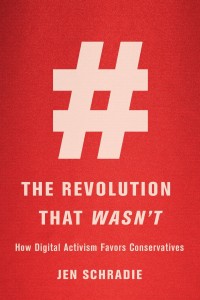“The  Revolution That Wasn’t reveals the textured reality of contemporary activism, challenging widespread assumptions about technology’s role in social movements. Beautiful storytelling and grounded insights make this book a delightful and important read for anyone who is concerned about politics today.”―danah boyd, author of It’s Complicated: The Social Lives of Networked Teens
Revolution That Wasn’t reveals the textured reality of contemporary activism, challenging widespread assumptions about technology’s role in social movements. Beautiful storytelling and grounded insights make this book a delightful and important read for anyone who is concerned about politics today.”―danah boyd, author of It’s Complicated: The Social Lives of Networked Teens
“Don’t believe the mythology of what works in digital activism, or the hyped advice that all voices can simply count. This book lays out the real deal. Perfect for change agents aiming to turn their wild ideas into new realities.”―Nilofer Merchant, author of The Power of Onlyness
“Trump has no overt presence in The Revolution That Wasn’t: How Digital Activism Favors Conservatives. But the compulsive tweeter comes constantly to mind as French sociologist Jen Schradie persuasively argues her counterintuitive case: digital organizing―once complacently thought by progressives to advantage their grassroots uprisings―has turned out to be another ‘weapon in the arsenal of the powerful.’”―Brian Bethune, Maclean’s
“The Revolution That Wasn’t synthesizes a wealth of accumulated knowledge to launch a new phase of scholarly endeavor. Blending ethnographic methods with quantitative assessments, Jen Schradie’s work shows that the claims of both digital optimists and pessimists miss the mark. She reveals that successful digital activism is linked to more traditional resources that give well-endowed groups a natural advantage, but one that can be acquired by their progressive opponents. A pleasure to read, and packed with vibrant interactions with activists of both types, Schradie’s book will take the study of digital activism to a new level.”―Sidney Tarrow, author of Power in Movement
“Simply put, The Revolution That Wasn’t overturns our reigning assumptions about digital activism. Schradie demonstrates how resources, organizations, and ideology shape the potentials for and outcomes of digital activism, and reveals the dynamics behind the conservative digital organizing resurgence in the U.S. since 2010. This highly readable and richly detailed book will become the first stop for those seeking to understand why the internet failed to live up to the ideals of democratic dreamers.”―Daniel Kreiss, University of North Carolina
